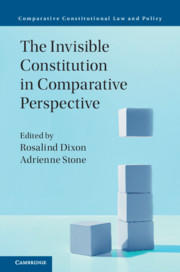Book contents
- The Invisible Constitution in Comparative Perspective
- Comparative Constitutional Law and Policy
- The Invisible Constitution in Comparative Perspective
- Copyright page
- Contents
- Contributors
- Part I Conceptualising the Invisible Constitution
- Part II The View from Asia Pacific and the Middle East
- 7 Behind the Text of the Basic Law
- 8 The Constitutional Orders of ‘One Country, Two Systems’
- 9 The Platonic Conception of the Israeli Constitution
- 10 The Indonesian Constitutional Court
- 11 Is the Invisible Constitution Really Invisible?
- 12 Constitutional Implications in Australia
- 13 Malaysia's Invisible Constitution
- 14 The ‘Invisible Constitution’ seen Realistically
- Part III The View from Europe and North America
- Index
8 - The Constitutional Orders of ‘One Country, Two Systems’
A Comparative Study of the Visible and Invisible Bases of Constitutional Review and Proportionality Analysis in the Chinese Special Administrative Regions of Hong Kong and Macau
from Part II - The View from Asia Pacific and the Middle East
Published online by Cambridge University Press: 02 November 2018
- The Invisible Constitution in Comparative Perspective
- Comparative Constitutional Law and Policy
- The Invisible Constitution in Comparative Perspective
- Copyright page
- Contents
- Contributors
- Part I Conceptualising the Invisible Constitution
- Part II The View from Asia Pacific and the Middle East
- 7 Behind the Text of the Basic Law
- 8 The Constitutional Orders of ‘One Country, Two Systems’
- 9 The Platonic Conception of the Israeli Constitution
- 10 The Indonesian Constitutional Court
- 11 Is the Invisible Constitution Really Invisible?
- 12 Constitutional Implications in Australia
- 13 Malaysia's Invisible Constitution
- 14 The ‘Invisible Constitution’ seen Realistically
- Part III The View from Europe and North America
- Index
Summary
- Type
- Chapter
- Information
- The Invisible Constitution in Comparative Perspective , pp. 230 - 267Publisher: Cambridge University PressPrint publication year: 2018

